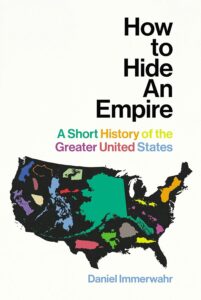U.S. History from the Outside In
By PHOENIX CARLISLE | Cover courtesy of the publisher
 As the new school year approaches, all of us look forward to the hope of new friends, more Friday night lights and securing a homecoming dance date. We are going to become educated — educated with the historical knowledge that our history books won’t talk about. The acknowledgment of history from the territories we know absolutely nothing about. This autumn, take time to learn more than what schools will teach you with How to Hide an Empire by Daniel Immerwahr (Farrar, Straus and Giroux, 2019).
As the new school year approaches, all of us look forward to the hope of new friends, more Friday night lights and securing a homecoming dance date. We are going to become educated — educated with the historical knowledge that our history books won’t talk about. The acknowledgment of history from the territories we know absolutely nothing about. This autumn, take time to learn more than what schools will teach you with How to Hide an Empire by Daniel Immerwahr (Farrar, Straus and Giroux, 2019).
We are familiar with maps that outline all 50 states, but we are often unfamiliar with the idea that the United States is an “empire,” exercising power around the actual territories — the islands, atolls and archipelagos — this country has governed and inhabited. How to Hide an Empire tells the fascinating truth of the United States outside the United States. In crackling, fast-paced prose, the author reveals forgotten episodes that cast American history in a new light. Readers travel to the Guano Islands for valuable commodities, and then all the way to Puerto Rico, where U.S. doctors conducted experiments they would never have conducted on the mainland. In the years after World War II, Immerwahr demonstrates, the United States moved away from colonialism. Instead, it put innovations into electronics, transportation and culture to use, devising a new sort of influence.
This book was brought into my life through a simple seating chart change. My U.S. history teacher had to draw my attention back to the class because my eyes kept wandering to the bookshelf I was way too close to. While I scanned the sideways spines, I found this eye-opening book.
Generally, I hate nonfiction because it bores me completely out of my mind. But because this book is historical, I decided to give it a try. It became a page-turner because I was shocked the whole time. History is a major love of mine and I continue to love when authors such as Immerwahr expose me to ideas that aren’t mentioned in mainstream materials as much as they should be. Learning the history of Guano and the harsh tactics inflicted couldn’t be more interesting, while learning about the creation of the birth control pill was heartbreaking.
Through this novel, I grew in sympathy for countries, people and cultures that I hadn’t known about before. Immerwahr tells the conflicting truth about the forgotten territories that are only miles away from our nation in a constructive flow with minor anecdotes that don’t feel like reading a brutal nonfiction book but rather a simple learning moment with a friend. I hadn’t ever really considered how the U.S. could be viewed as an empire until I realized the full extent of its territories. I was quick to criticize England’s history of branching out without truly evaluating what the country I was living in was actively doing.
If you pick up this book, make sure you can dedicate time to absorbing it. There is a confusing timeline as the author jumps around a lot while introducing overlapping timelines for different countries. It was an immersive storyline which has its pros and cons, like any other novel.
This academic year, get educated. Educated on the lives and histories of cultures beyond the 50 united states. Taking the time to read this piece was a valuable moment that I would dedicate time to again. Learning will never be a waste.




